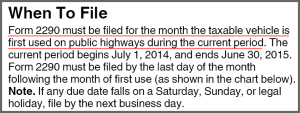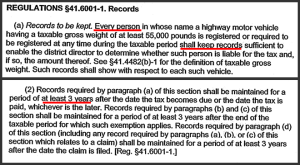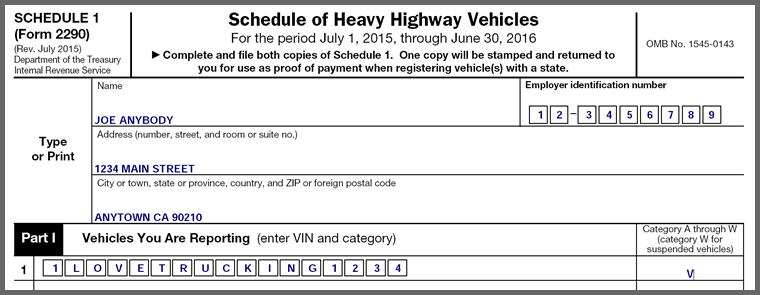I’m not using my truck – do I still file a 2290?
Form 2290 is a USE tax, not an OWNERSHIP tax. That means if you’re not using your truck you don’t file a 2290 for that truck. But it gets tricky, you need to be careful of two things. First, you want to be sure you have the correct “Date of First Use.” Second, recordkeeping, recordkeeping, recordkeeping! Keeping these two things in mind should help you save money, file accurately, and protect you in the case of an audit.
Finding the Right “Date”
The IRS defines the word “use” in the instructions of Form 2290. Basically, it’s exactly what you think. If you drive your truck on the road, that’s using your truck.
![]()
The “Date of First Use” is referring to the first month you use your truck during a given tax period. Remember, the 2290 uses a Fiscal year, beginning July 1st, and ending the following June 30th.

Put those two things together, and it means you don’t file until you use your truck in a given tax period.
Example 1:
John works seasonally. He only uses his truck to deliver Christmas presents between October and January. The rest of the year, his truck is parked on his property. John should file his 2290 each year with a date of first use in October, and his taxes will be prorated.
Example 2:
Amanda also works seasonally. Her busy season begins in May and ends in September. She must file with a date of first use of July each year, because the tax period begins in July, and she’s using her truck in July. Her taxes will not be prorated.
Example 3:
Mike purchased a truck in January and it needed some maintenance. It was ready to operate in March. He must file a 2290 with a date of first use in March because that’s when he first used the truck, even though that doesn’t match his purchase date. His taxes will be prorated.
In all these examples the date of first use determines the filing period and you’ll want to keep good records of this date.
Recordkeeping:
As always, recordkeeping is required for all federal tax forms. The 2290 is no different. If you’re going to say that you didn’t use your truck until October, you had better be prepared to prove it. The IRS has the power to audit and assign penalties if you don’t provide the requested records.
Proving a Negative
Proving your truck didn’t move can be extremely difficult. The article Form 2290 Proof for Suspended Vehicles gives us a clue about the kinds of records you may be asked to provide if you are audited.
Log books might work as proof. IFTA Tax non-op reports might work. A statement from your insurance company about diminished coverage might work. A Non-Operations Permit from your state might work. A long term parking invoice might work. A gap in your fuel purchases might work.
Remember that you are required to keep these records for the 3 year audit period, and that you can be penalized in addition to your taxes if you don’t.

Save some money if you can, but protect yourself first and foremost.
Form 2290 Expiration
It says right on top of your Stamped Schedule 1, that the form is for the period of July 1, through June 30th. But you don’t have to file the new form before the old form expires.

This question always comes up for people with renewals in the summer. Remember, you can use last years form to renew this year, if your registration is due during the summer. Read here for full details.
Call us if you have any questions about this. A tag office that doesn’t already know this isn’t bad, they are simply in need of training, and we can notify the IRS about which offices need this assistance.
The Disclaimer:
I’m not a CPA, enrolled agent, or attorney. That means I can’t, and don’t interpret the law. I’m just a regular person who deals with this stuff a lot. While I have experience, I don’t have lots of fancy education, training or certifications. I’m just sharing my experience with you. Telling you how I’ve resolved things in the past, or what I’ve been told by the IRS when I call with my own questions. No guarantees that my advice is perfect or that it works every time! It’s just what works for me…
Written by Casey Jenkins
